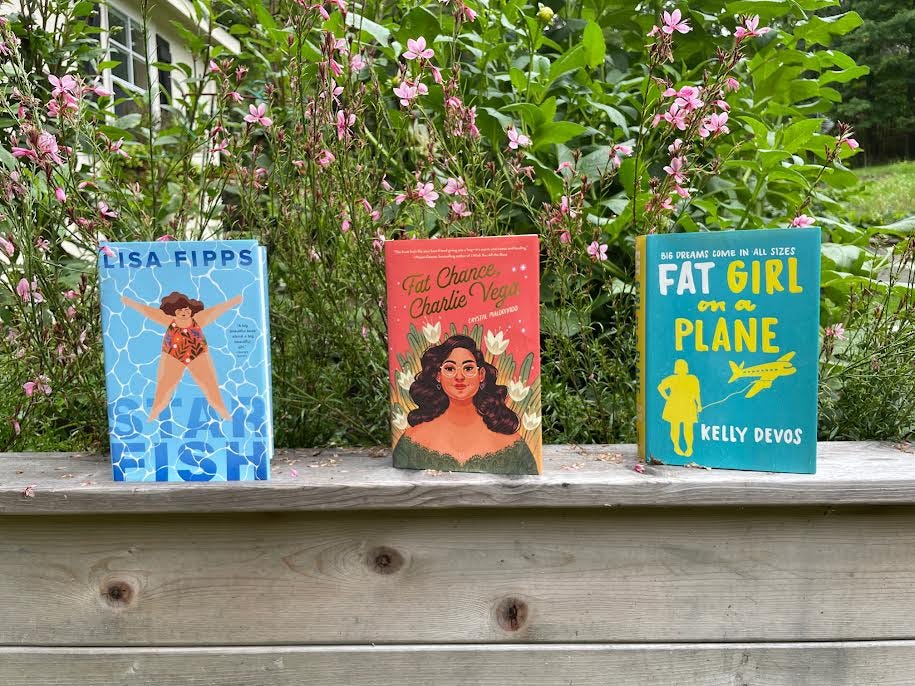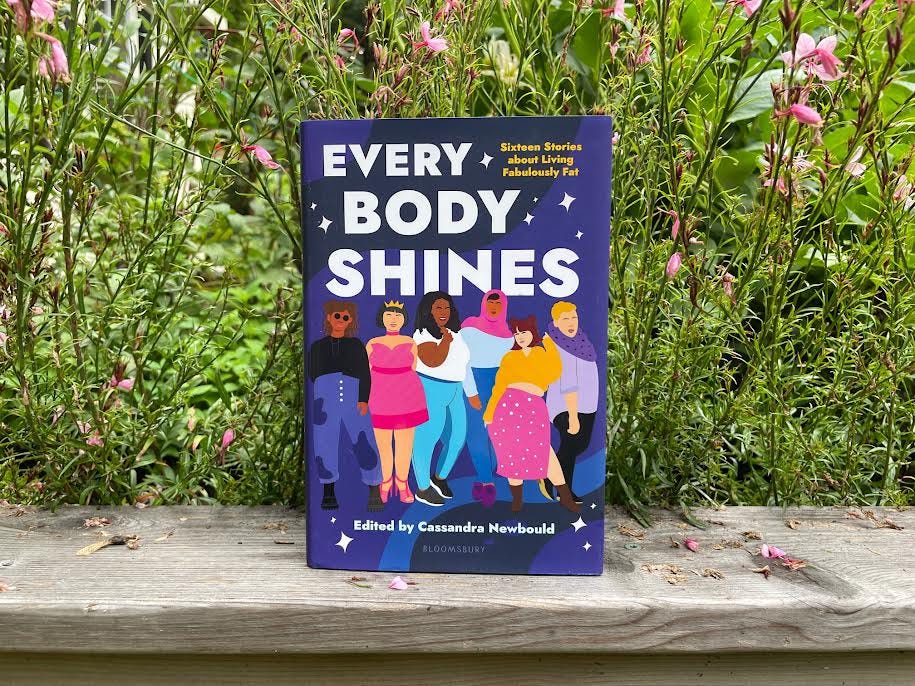Body Positive Bookshop: Middle Grade and YA
Plus, thoughts on rejecting the Evil Mom trope and keeping readers safe.
Hi friends!
I’m delighted to be back from Burnt Toast’s summer break, otherwise known as the lost weeks between the end of camp and the start of school when, yes, I make memories with my children, but I also have Frequent Unkind Thoughts about the fundamental incompatibility of American education and the needs of working parents. Anyway! School is back in session, so I have a brief few weeks before the holidays screw it all up again to write a bunch of book chapters and make newsletters while the sun shines. Let’s get to it!
Coming up Thursday: I’m chatting with Alyson Gerber, author of the brilliant new middle grade novel TAKING UP SPACE. You can learn more about Alyson here, and follow her on Insta and Twitter. Alyson is delightful and we talked a lot about her own struggles with disordered eating, as well as her writing process and motherhood. Consider going paid, so you don’t miss that conversation.
Something else that Alyson and I discuss is how to write about eating disorders and fatphobia without reinforcing the same tired old stereotypes about these issues—and without triggering readers who might be in a vulnerable space. In my work, I have the added pressure of making sure that folks who are sharing their stories with me feel safe and empowered. As a journalist, I constantly walk the line between amplifying someone’s voice and exploiting them to tell the story. There are strategies that help mitigate that risk, of course. I find myself changing names or using only first names far more often these days than when I first started out, when magazine editors were always pushing me to get sources to go fully on the record. There’s no question that using someone’s full name adds to the veracity and authenticity of their story. There’s also no question that it often comes with a cost (for them, not for me, or the outlet publishing their story). But even beyond the logistics of how we identify a subject, there are murky questions, like, how much detail about their eating disorder is enough to make the story real to readers, but not so much that it teaches someone a new way to self-destruct? If they tell me something their mother said that caused harm, do I call the mother to verify that she really said that—or does that cause more trauma to a family already in crisis?
I don’t have clear answers to these questions. I increasingly feel that journalism, as a field, lacks clear answers to these questions. And so I answer them a little differently every time, based on what a source tells me they need to feel safe. For the new book, I’m interviewing a lot of kids, so this issue of safety is really on my mind. And Alyson said it’s always on her mind, as well. Even though the people she writes about are fictional, she thinks about how to keep the kids reading her book safe, while still showing them the hard realities, and the many nuances, of the story she’s telling.
It can be unnerving to hand our kids a book about a character wrestling with weight stigma or an eating disorder. (As I’ve written before.) The fear is that we might be giving them a how-to manual or teaching them to fear their body in a way they hadn’t previously. But the reality is that your kids are already learning that the world treats fat bodies as less than; they’re already learning that lots of adults (and other kids) subscribe to complicated ideas about good and bad foods. So we absolutely need children’s books where characters are unapologetically fat and unapologetically proud of their bodies, and where weight and food are not their main plot lines. But we also need books where real kids are dealing with these issues and emerging victorious, or at least hopeful.
The list of books I’ve got for you today does a bit of both. These are all middle grade and YA books (mostly novels) that largely center on body-image struggles—but in every case, these are characters who are so much more than their bodies. Many also feature protagonists of color, some in bigger bodies.
PS. The “Bookshop” thing in the headline is just catchy; at this point, I’m not doing affiliate links for these posts. But I am linking to all of these over on the website of Split Rock Books, my beloved local indie. They ship! (Or find an independent bookstore near you here.)
Middle Grade Novels:
TAKING UP SPACE by Alyson Gerber (ages 8-12)
Sarah loves basketball, but lately, she can’t play the way she wants. She starts to think she needs to make herself smaller to make herself matter. This also features one of the most nuanced and loving portrayals of a mother with an eating disorder that I’ve read.
STARFISH by Lisa Fipps (ages 10 and up)
Ellie has always tried to live by her Fat Girl Rules, but they aren’t keeping her safe anymore—at school or at home. Written in beautiful, heart-wrenching verse, this is not an easy read, but it’s an important one. I raved about this book a whole bunch here.
CHUNKY by Yenudi Mercado (ages 8-12)
OK, full disclosure, this is the one I haven’t read yet, but I’m including it on the list because Sarai Walker included it in her NYT Book Review roundup, and because it’s the only one on my list with a male protagonist.
BEAUTIFULLY ME by Nabela Noor (ages 4-8)
Zubi is a joyful Bangledeshi girl, excited about her first day of school until she sees her mother frowning at her bigger body in the mirror. This first novel from activist, influencer, and entrepreneur Nabela Noor is a lovely celebration of self-love and body diversity. P.S. I’ll be doing an Instagram Live interview with Nabela for Parents Magazine on September 25 at 2pm ET, to chat more about this one!
Young Adult Novels:
FAT CHANCE CHARLIE VEGA by Crystal Maldonado (ages 12 and up)
Charlie Vega is a lot of things: Smart. Funny. Artistic. Ambitious. Fat. People sometimes have a problem with that last one. I adore Charlie (and her friends) so so much. Maldonado deals with Charlie’s body-image struggles and experiences of weight stigma, BUT her story is so much richer than that. And (spoiler alert!) the fat girl gets the guy. (And there are also non-hetero romance plot lines!)
DUMPLIN’ by Julie Murphy (ages 12 and up)
Caveats: I’ve only read the first in this series (and haven’t seen the Netflix movie yet!). And there are a few points where Willowdean oscillated between self-acceptance and self-loathing in ways that I found inconsistent from a writing standpoint. But overall, Dumplin’ is a lot of fun, especially if you’re also a Dolly Parton fan.
FAT GIRL ON A PLANE by Kelly deVos (ages 12 and up)
CW because this one does contain a little more explicit dieting and weight talk, which might not be safe for all readers. But Cookie is a great protagonist, trying to get out of Phoenix and launch her fashion career without losing track of herself.
Young Adult Anthologies:
THE (OTHER) F WORD: A CELEBRATION OF THE FAT & FIERCE edited by Angie Manfredi (ages 13 and up)
A truly awesome collection of essays, prose, poetry, fashion tips, and art from fat authors, influencers, and creatives, including Samantha Irby, Jes Baker, Saucye West, Miguel Morales, and so many more.
EVERY BODY SHINES: SIXTEEN STORIES ABOUT LIVING FABULOUSLY FAT edited by Cassandra Newbould (ages 14 and up)
Short stories by Kelly deVos, Nafiza Azad, Linda Camacho, Monique Gray Smith, and more, with a great foreword by Aubrey Gordon of Your Fat Friend fame (ICYMI catch my conversation with Aubrey here).
Also
Deciding what’s for dinner: The conversation we started here about the tyranny and misogyny of meal planning continued on “The Brian Lehrer Show.” Listen here.
Or deciding not to family dinner: Sara B. Franklin—a former vegetable farmer, food systems advocate, and restaurant critic turned writer and professor of food studies—profiled me for Romper. Read more here.
Grandparents on diets (again!): Suzie Glassman interviewed me for a story for Parents about how to ask relatives to not talk about your kid’s body. Read here.







I’d love to hear recs for nonfiction books for middle grades. Starting to pre-read options before I give them to my 8yo and finding disappointing fatphobic language.
I really can't disagree more with your recommendation of Fat Girl on a Plane. I have been looking for fat rep my whole life (I'm 42 now) and there are so many better examples for YA audiences. I don't think we should hold up dieting protags as good fat rep, tbh. Those stories can be out there, but I would never recommend any story like that to a teen reader. The harm it could do! (No matter the "moral" of the story.) (Also, I'm a librarian, so this is something I actually do have to think about on a real-world level; would I give this book to a Mom who is looking for something for her teen girl? Would I hand this directly to a teen girl? And the answer is no and no.)